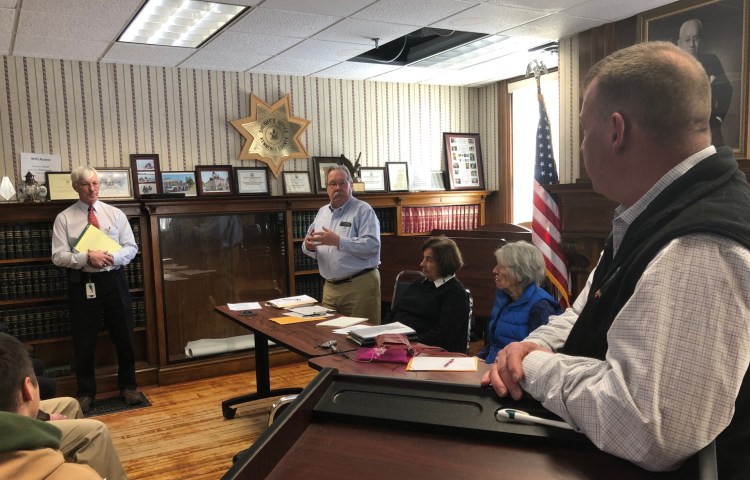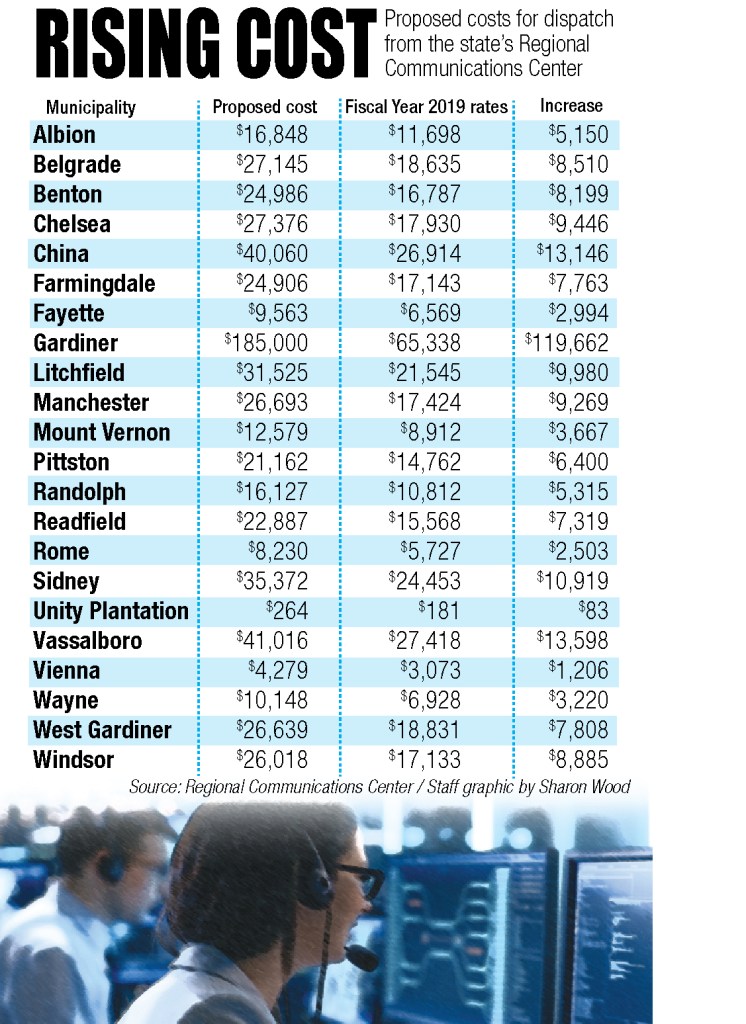AUGUSTA — As Kennebec County municipalities look to settle on a dispatch option for the upcoming fiscal year, support appears to be growing for staying with the state-run agency.
Cliff Wells, emergency communications director for the Department of Public Safety, has also denied claims that the Augusta regional communications center he oversees is underfunded.
These developments were announced Thursday morning at a special commissioners’ meeting that drew a large crowd of law enforcement and municipal officials from across Kennebec County.
The situation affects Albion, Belgrade, Benton, Chelsea, China, Farmingdale, Fayette, Gardiner, Litchfield, Manchester, Mount Vernon, Pittston, Randolph, Readfield, Rome, Sidney, Unity Plantation, Vassalboro, Vienna, Wayne, West Gardiner and Windsor.
‘NEVER SAID “UNDERFUNDED”’
Wells said that the county’s sheriff, Ken Mason, mistakenly suggested that funding problems drove 22 of the area’s communities out of the state-run agency.
“I don’t know exactly where it came from, but we’ve never said ‘underfunded,’ ’cause we’re not. I know that,” Wells said.
Mason reported having heard about the agency’s poor financial standing in a conversation he had with Wells at the end of December, though Wells adamantly refuted that claim. Mason later stated that the information stemmed from a meeting in Vassalboro.
“It was somebody outside the organization who had the conversation with the sheriff,” Wells said. “And I don’t know if it was mischaracterized — we’re funding for four (dispatchers and) we need to fund seven — or was there the impression that we were underfunded. I don’t know what was said at that meeting. But the words ‘underfunded’ did not come from me, ‘cause we’re not underfunded.”
The sheriff said he heard that the regional communication center was failing to cover its costs in a spoken conversation with Wells but could not provide any written documentation to support the allegation. Gardiner police Chief James Toman said he heard from Mason that the RCC was underfunded, but not directly from Wells at any point.
“I don’t remember how it came about,” Mason said last week. “I emailed (Wells), asked to sit down and talk to him in late December (and) he said it was funding issues, that they had been underfunded for years. … They just hadn’t been paid enough by the towns.”
In continuing to deny the claim, Wells noted that the agency, at times, has gathered more money than it needed and gives money back to its users if it collects more than it spent during that year.
“Say we have 65 (employees),” Wells said. “If I only have 55 workers, we’re still collecting for 65. At the end of the fiscal year, if I have excess funds — these communities have gotten a fourth-quarter credit from us in the past.”
Mason had been frustrated when he found out in December that the state-run dispatch center could continue to serve the county if it charged the municipalities more money to hire seven more dispatchers. He already had researched other options and had difficult conversations about the situation with constituent communities when he learned the county might be able to stay with the RCC.
Wells maintained that what spurred his August notification that the regional communications center no longer could serve the Kennebec County Sheriff’s Office was software-related.
“My biggest concern is running two different computer systems,” he said. “There’s just room for error. And if we have to do it, we have to do it, and we’ll do everything we can to avoid error, but there’s the potential for mistakes from running two different systems.”
Mason remains reluctant to embrace that as the sole reason.
“He can say words any way. This was information got from a meeting in Vassalboro,” Mason said. “It really doesn’t matter. It just would have been nice if back in August, he (would have) just gone, ‘Look, we’re not funded for this. This is the actual costs.’ We would have had that number, put that out there, and you and I wouldn’t have been talking today.”
GARDINER’S COMPROMISE
Earlier this week, Gardiner City Manager Christine Landes sent municipal officials from the other 21 affected communities a proposal for subsidizing their communities’ dispatch costs in order to persuade them to stay with the RCC. She discussed the offer Thursday.
“Realizing that (the RCC price for the county) was an increase of about $265,000 above the City of Augusta proposal, the City of Gardiner has offered to contribute at a higher rate than the other municipalities,” the letter, dated Monday, reads. “They have offered to pay $185K of this increase, annually for three years, to keep the CMRCC dispatch service functioning status quo.”
If the other Kennebec County towns did not opt to stay with the RCC, Augusta police would dispatch law enforcement for the municipalities. Augusta police Chief Jared Mills said that the room that the department dispatches out of is too small to fit the four extra dispatchers that it would need to hire in order to take on Gardiner’s call volume. Gardiner would be left paying upwards of $300,000 to purchase software that the RCC is switching to and an additional $60,000 or more for actual dispatch service, a move Mason has referred to as “hanging (Gardiner) up to dry.”
“I’m asking for your support, to stay with the RCC until we can figure this out,” Landes said at the Thursday meeting.
Mary Sabins, town manager of Vassalboro, co-signed the Monday memo. Vassalboro stands to benefit from staying at the RCC because if the county moved dispatch service to the Augusta Police Department, the town — along with Chelsea, Litchfield and Windsor — would have to finance the purchase of digital radios over a period of up to five years. Augusta’s police dispatch is not compatible with analog radios over the long term. Digital mobile radios cost about $1,400 apiece, while digital portables cost roughly $1,200, according to Vassalboro firefighter Mike Vashon.
Costs for law enforcement dispatch service will rise regardless of whether the county stays with the RCC or switches to Augusta police. Staying at the RCC means next year’s annual cost increases range from $83 for Unity Plantation to $13,598 for Vassalboro. Excluding Gardiner, dispatching from Augusta police would result in expenses rising by a quantity as low as $33 for Unity Plantation to as high as $5,836 for Vassalboro. This does not include the towns’ radio or PSAP (public safety access point) expenses.
While Landes said she has not heard any formal commitments from other towns at this point in response to the letter, several people voiced support Thursday for staying with the RCC — including Mills.
“As this has evolved, I’m listening to this too, and it sounds to me like this is the best option — for the RCC … to keep you together,” Mills said. “I think if I had the option of taking both (Gardiner and the rest of Kennebec County), I could be much more competitive with that (offer) and that might be a better fix; but listening to … everything and how this has evolved, (staying with the RCC) sounds like a pretty good plan.”
Mason seemed certain Thursday that the RCC would be the path forward for the county’s law enforcement dispatch come July.
“What’s going to happen is that we’re going to go back to a normalcy because everything’s been really up in arms,” he said after the meeting, later adding, “Now (I’m) gonna jump on that (band)wagon and put it out to the towns: We’re staying. The RCC will be forwarding you a contract and it will be this amount.”
Each municipality still will be able to choose whether to contract with the RCC, however. The county does not have that authority.
“It’s just so important to bring everybody back to the way that it was,” Mason said. “Let everybody calm down.”
Landes said she felt encouraged to “hear some of the cities step up and endorse the plan, especially the sheriff and the chief from Augusta.”
A CALL FOR OVERSIGHT
Landes and Sabins also suggested convening a governing body to advise Wells and conduct a “thorough review” of the dispatch situation. They asked municipal officials to support a proposal they sent to state senators and representatives to re-establish the Emergency Communications Board, which was disbanded several years ago.
“This board, with appointed members that use both the IMC and Spillman programs, would be asked to perform an analysis on both dispatch programs covering costs, benefits, deficits, a request to have an interface between the Spillman and IMC software program developed, and even the thought process of having a dispatch service back at the county level,” Landes and Sabins wrote in a memo to municipal officials.
The state-run regional communications center is launching Spillman in June, and Kennebec County wants to keep using IMC. The two programs are incompatible.
The city of Augusta is in the early phases of planning a new emergency services building and will discuss whether to incorporate a county dispatch center into those plans.
“That could happen,” Gardiner fire Chief James Toman said.
Windsor Town Manager Theresa Haskell said she would support the formation of an Emergency Communications Board so the county can continue to think creatively about dispatch solutions and not be forced down one singular path.
“I do want to appreciate the Augusta Police Department stepping up to the plate and offering (to dispatch for most of the county) at that point in time and then having this other option with Gardiner,” she said Thursday. “So I just want to appreciate everybody doing this, and that’s why I think you need to have a board, so you have more than one option.”
Kennebec County Commissioner Nancy Rines, whose district includes Gardiner, asked whether any oversight board exists for the state-run dispatch program today.
Robert Devlin, Kennebec County’s administrator, and Wells noted that the board was abolished after it became inactive and struggled to meet a quorum. Today, a user group exists to advise, but not approve or reject policies.
“This agency was — when it was established by the bureau, it was established with a policy board that looked at policies, budgets, et cetera,” Wells said. “In the beginning, they were very active, they were meeting every two weeks and then I came on board and it started to back off to monthly and they were active, they were doing policies. I’d present my policies to the board, and they would approve it. As time went on, the system was working, things were functioning, the board members were not showing up and … the commissioner and I talked about it and the commissioner put up a piece of legislation to abolish the policy board and move powers to the bureau.”
“Interesting, isn’t it,” Rines replied.
Meg Robbins — 861-9239
Twitter: @megrobbins
Send questions/comments to the editors.




